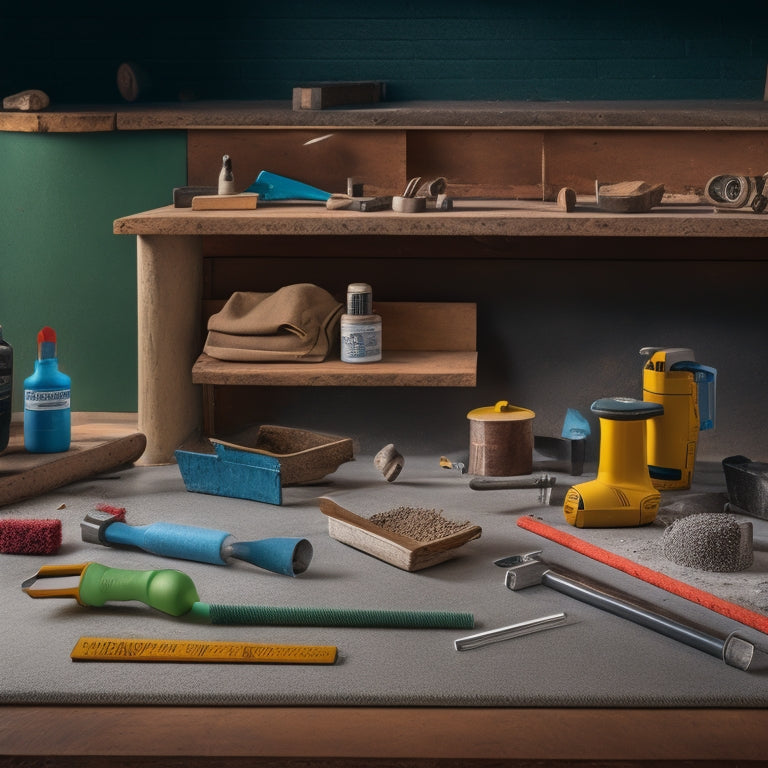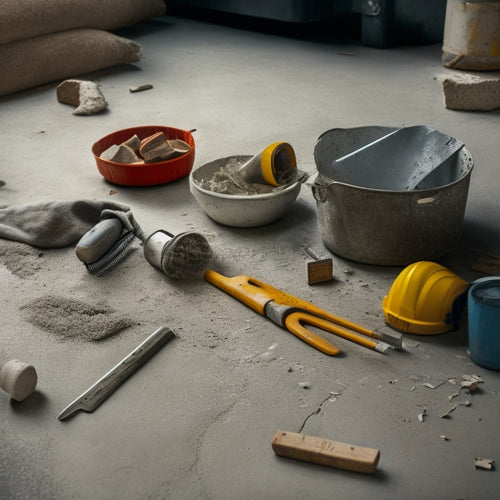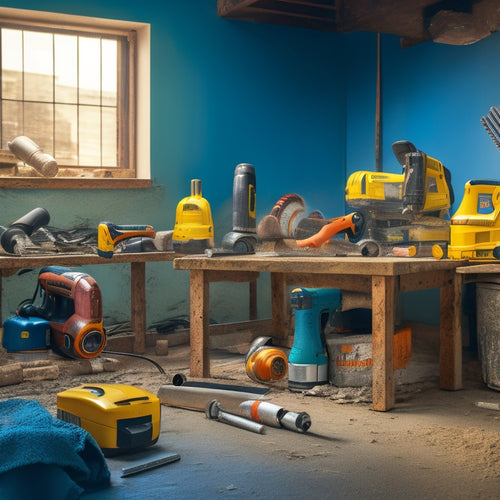
Why Choose These Top-Rated Concrete Jointing Tools
Share
When choosing top-rated concrete jointing tools, you'll want to prioritize durability, material compatibility, and ergonomic design to guarantee peak results. Look for tools with rust-resistant blades, adjustable handles, and contoured grips that reduce fatigue and discomfort. Top brands like Makita, DeWalt, and Bosch offer high-quality, reliable tools for various projects. Whether you're a DIY enthusiast or contractor, selecting the right tool can make all the difference in achieving precision and efficiency. By understanding what to look for in a concrete jointing tool, you'll be able to tackle your projects with confidence and achieve professional-quality results, and there's more to explore about how to get the best out of your tools.
Key Takeaways
• Top-rated concrete jointing tools prioritize durability, ensuring long-lasting performance and minimizing downtime for efficient project completion.
• Ergonomic designs and balanced weight reduce fatigue, allowing users to focus on jointing tasks with precision and accuracy.
• High-quality materials and rust-resistant coatings enhance tool longevity, reducing the need for frequent replacements.
• Versatile tools accommodate various jointing tasks and techniques, making them suitable for diverse applications and user preferences.
• Top brands offer instructional support, user-friendly designs, and affordable options, making high-quality jointing tools accessible to DIY enthusiasts and professionals alike.
Essential Features to Look For
When selecting a concrete jointing tool, you'll want to prioritize essential features that assure efficient and accurate joint formation, starting with a durable and rust-resistant blade designed to withstand the demands of frequent use. This will guarantee that your tool can handle the rigors of concrete jointing without compromising on performance.
Another critical factor to evaluate is material compatibility - you'll want a tool that can work seamlessly with various concrete mixes and aggregates. This will give you the flexibility to tackle diverse projects without worrying about compatibility issues.
Additionally, reflect on the jointing techniques you'll be using. Will you be using a saw-cut or a tooled joint? Choose a tool that's optimized for your preferred technique to achieve professional-looking results.
A comfortable grip and balanced design will also reduce fatigue and improve control, allowing you to work for extended periods without strain.
Top Brands for DIY Projects
With your priorities in place, you can now focus on selecting a reputable brand that caters to DIY projects, offering the right combination of quality, affordability, and ease of use.
When it comes to concrete jointing tools, top-rated brands like Makita, DeWalt, and Bosch are popular choices among DIY enthusiasts. These brands offer a range of products that meet the specific needs of DIY projects, from compact and lightweight designs to advanced features like adjustable handles and LED lights.
For DIY project recommendations, consider brands like Hitachi and Ryobi, which offer versatile and affordable tools that are perfect for small to medium-sized projects. These brands provide a great balance between quality and price, making them an excellent choice for DIYers on a budget.
Additionally, brands like Hilti and Milwaukee offer high-end tools that are designed for heavy-duty use, making them ideal for larger and more complex DIY projects.
Best Tools for New Users
When you're new to concrete jointing, it's important to choose tools that won't overwhelm you.
You'll want to select tools that are easy to use, offering intuitive designs and minimal setup requirements.
Easy to Use Tools
How easily you can master concrete jointing depends on the tools you choose, and as a new user, you'll want tools that are intuitive and straightforward to operate. Look for concrete jointing tools with user-friendly designs that make it easy to understand how to use them. This is particularly important if you're new to concrete jointing and don't have experience with these types of tools.
Tools with ergonomic handles are also a must-have. They'll reduce fatigue and discomfort, allowing you to work for longer periods without feeling strained. Additionally, ergonomic handles will give you better control over the tool, making it easier to maneuver and accurate in your jointing work.
When choosing concrete jointing tools, consider the weight and balance of the tool. A well-balanced tool will be easier to handle and will reduce the risk of accidents. Moreover, look for tools with clear instructions and markings, making it easy to understand how to use them and what settings to use for different types of joints.
Essential Features to Consider
You'll need to prioritize tools with five essential features to guarantee you're getting the best concrete jointing tools for your needs as a new user. These features will make certain you can handle various jointing tasks efficiently and effectively.
Firstly, consider material compatibility. You'll want tools that can handle different types of concrete, including freshly poured, cured, and reinforced concrete. This versatility will allow you to tackle a range of projects without needing multiple tools.
Secondly, think about the jointing techniques you'll be using. Will you be saw-cutting, hand-tooling, or using a combination of both? Choose tools that cater to your preferred technique to achieve professional-looking results.
Thirdly, look for tools with adjustable handles or ergonomic grips to reduce fatigue and improve control.
Fourthly, consider the tool's weight and balance, as this will impact your ability to maneuver it comfortably.
Lastly, make sure the tool comes with clear instructions or online tutorials to help you master various jointing techniques.
Tool Durability Matters
As you prioritize tools with the right features, it's equally important to evaluate their durability, especially if you're new to concrete jointing. A tool's lifespan directly impacts your productivity and bottom line. A durable tool can withstand the rigors of repeated use and harsh environmental conditions, reducing the need for frequent replacements and minimizing downtime.
When evaluating tool durability, consider the material selection of the tool's components. Look for high-quality materials that can resist corrosion, abrasion, and impact. For instance, tools with stainless steel or heavy-duty polymer components tend to be more durable than those with inferior materials.
In addition to material selection, maintenance tips can greatly extend a tool's lifespan. Regularly clean and lubricate moving parts, store tools in a dry and protected area, and avoid exposing them to extreme temperatures. By following these guidelines, you can guarantee your concrete jointing tools remain in prime condition, allowing you to focus on delivering high-quality results efficiently and effectively.
Ease of Use Matters Most
When you're working on a concrete jointing project, you need tools that won't slow you down or cause frustration.
That's why ease of use is a critical factor in selecting the right tools for the job.
You'll want to look for tools that offer a simple operation design, reduce fatigue, and make joint cleaning a breeze.
Simple Operation Design
Concrete jointing tools with simple operation designs typically feature intuitive handles, adjustable grips, and easy-to-access controls, allowing operators to focus on the task at hand. These user-friendly mechanics reduce the cognitive load on you, facilitating you to work efficiently and accurately. Ergonomic designs guarantee that the tool fits comfortably in your hand, minimizing strain and discomfort.
| Feature | Benefit |
|---|---|
| Intuitive Handles | Easy to grip and maneuver |
| Adjustable Grips | Customizable fit for your hand |
| Easy-to-Access Controls | Quick access to settings and adjustments |
With a simple operation design, you can devote more attention to the concrete jointing process itself, rather than struggling with the tool. This results in higher-quality work, reduced errors, and increased productivity. By choosing a concrete jointing tool with a simple operation design, you can work smarter, not harder.
Reduced Fatigue Factor
You'll appreciate the reduced fatigue factor of a well-designed concrete jointing tool, which allows you to work for extended periods without feeling exhausted or drained. This is essential, as fatigue can lead to decreased productivity, accuracy, and overall job quality.
A tool with an ergonomic design prioritizes user comfort, reducing the physical strain associated with jointing tasks. This means you can focus on the task at hand, rather than struggling with an uncomfortable or cumbersome tool.
When selecting a concrete jointing tool, look for features that promote comfort and reduce fatigue. A contoured grip, adjustable handle, and balanced weight distribution all contribute to a more comfortable working experience.
Additionally, tools with anti-vibration technology or shock-absorbing materials can further reduce fatigue. By choosing a tool that prioritizes your comfort and well-being, you'll be able to work more efficiently and effectively, ultimately producing high-quality results.
With a reduced fatigue factor, you'll be able to tackle even the most demanding jointing tasks with confidence and precision.
Effortless Joint Cleaning
Effortless Joint Cleaning
By streamlining the joint cleaning process, top-rated concrete jointing tools enable you to maintain a clean and debris-free joint, ensuring a strong, long-lasting bond between the concrete slabs. This is essential, as any dirt, dust, or debris left behind can compromise the integrity of the joint, leading to cracks and failures. With the right tools, you can efficiently remove dirt and debris, allowing for a strong bond between the concrete and the sealant.
Here are some cleaning techniques and maintenance tips to keep in mind:
| Cleaning Technique | Tool | Benefits |
|---|---|---|
| Wire brushing | Stiff-bristled wire brush | Effective at removing loose dirt and debris |
| Vacuuming | Industrial vacuum cleaner | Quickly removes dust and dirt from the joint |
| Compressed air | Compressed air gun | Gently blows away dirt and debris without pushing it deeper into the joint |
Durability in Harsh Environments
In extreme weather conditions, your jointing tools are exposed to corrosion, abrasion, and impact, making durability a critical factor in their performance and longevity. You need tools that can withstand harsh environments, guaranteeing consistent results and minimizing downtime.
That's why weather resistance is a key consideration when selecting jointing tools. Look for tools with a high level of weather resistance, such as those with rust-resistant coatings or corrosion-proof materials.
The material quality of your jointing tools also plays a significant role in their durability. High-quality materials can withstand the rigors of heavy use and harsh environmental conditions, reducing the risk of wear and tear.
When evaluating jointing tools, consider the type of materials used in their construction. Are they durable and long-lasting, or are they prone to corrosion and degradation? By choosing tools with superior material quality and weather resistance, you can guarantee that your jointing tools remain reliable and effective, even in the most challenging environments.
Versatility in Jointing Tasks
When tackling various jointing tasks, concrete contractors need tools that can adapt to different applications, such as saw-cutting, hand-tooling, and power-tooling, to guarantee efficient and effective jointing.
You require tools that can seamlessly shift between tasks, securing consistent results and minimizing downtime. Versatility in jointing tools is essential, as it allows you to tackle complex projects with confidence.
When selecting jointing tools, consider the joint precision techniques you'll be using. For instance, will you be using diamond blades or abrasive wheels? Verify your tools can accommodate these different methods.
Additionally, material compatibility considerations are significant. You'll need tools that can effectively joint various concrete types, including high-strength, fiber-reinforced, and decorative concrete.
Top-rated jointing tools are designed to accommodate these differences, providing you with the flexibility you need to tackle diverse projects. By choosing versatile jointing tools, you can rest assured that you're equipped to handle any jointing task that comes your way, resulting in higher quality work and increased customer satisfaction.
Budget-Friendly Options Available
You can find top-rated concrete jointing tools that fit your budget, allowing you to achieve professional results without breaking the bank.
These budget-friendly options are designed to provide cost-effective solutions for various jointing tasks. Whether you're a DIY enthusiast or a contractor, you can find affordable alternatives that meet your needs without compromising on quality.
When searching for budget-friendly concrete jointing tools, look for products made from durable materials that can withstand heavy use.
Consider tools with adjustable handles, allowing you to customize the grip to your comfort level. Additionally, opt for tools with replaceable parts, reducing waste and saving you money in the long run.
Some top-rated concrete jointing tools offer a range of features at an affordable price point.
For instance, you can find jointing tools with ergonomic grips, reducing fatigue and improving control. Others may feature interchangeable blades, allowing you to tackle different jointing tasks with ease.
Frequently Asked Questions
Can I Use Concrete Jointing Tools for Other Construction Projects?
You're wondering if concrete jointing tools can be used for other construction projects. The answer is yes, they can!
These tools offer alternative uses beyond concrete jointing, thanks to their versatility. You can repurpose them for tasks like grouting, caulking, or even applying adhesives.
Their precision and durability make them suitable for various applications. By exploring their capabilities, you can maximize their value and get the most out of your investment.
How Often Should I Clean and Maintain My Jointing Tools?
Did you know that 80% of tool failures are due to inadequate maintenance?
You'll want to clean and maintain your jointing tools regularly to guarantee tool longevity. After each use, wipe down tools with a dry cloth to remove debris. Store them in a dry place to prevent rust.
For more thorough maintenance, disassemble and lubricate moving parts every 3-6 months.
Are Concrete Jointing Tools Suitable for Small-Scale DIY Projects?
When tackling small-scale DIY projects, you're likely wondering if concrete jointing tools are suitable for the job.
The answer is yes, they offer excellent DIY versatility.
These tools are designed to handle various project scales, from minor repairs to larger construction tasks.
Can I Rent Concrete Jointing Tools Instead of Buying Them?
You're considering renting concrete jointing tools instead of buying them. This can be a cost-effective option, especially for small-scale projects.
Calculate the rental costs and compare them to the tool's purchase price. Also, check tool availability at local equipment rental stores.
Ascertain the rental tools meet your project's specific requirements. If you only need the tools for a short period, renting might be the way to go.
Do Concrete Jointing Tools Come With a Warranty or Guarantee?
Imagine buying a new car without checking the warranty - you'd want to know you're protected in case something goes wrong.
Same with concrete jointing tools. You'll want to know if they come with a warranty or guarantee.
Fortunately, most top-rated tools do offer warranty coverage, which speaks to their reliability.
Look for tools with a minimum 1-year warranty, and some even offer up to 5 years of protection.
This guarantees you're covered in case your tool fails or needs repairs, giving you peace of mind on the job site.
Conclusion
You've navigated the complex landscape of concrete jointing tools, and now you're ready to make an informed decision.
As you commence your DIY project or professional venture, remember that the right tool is the key to revealing a durable, long-lasting finish.
With the top-rated concrete jointing tools by your side, you'll be paving the way to a masterpiece that's as strong as it's stunning.
Related Posts
-

Top 10 Concrete Repair Tools for Small Fixes
You'll need the right tools to tackle small concrete repairs efficiently and effectively. When it comes to small fixe...
-

Top Tools for Mixing Concrete at Home
When mixing concrete at home, you'll need a range of tools to guarantee a successful operation. Start with essential ...
-

Essential Power Tools for Concrete Block Construction
When building with concrete blocks, you'll need a range of power tools to cut, drill, mix, and finish the blocks to g...


